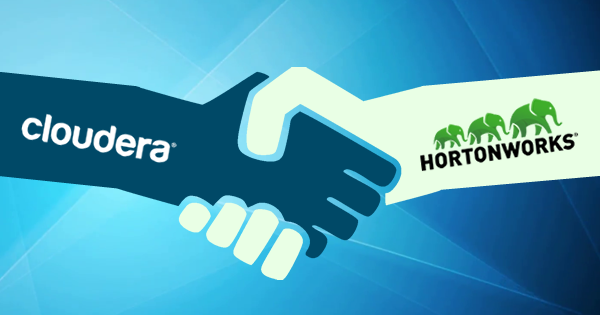Top Big Data vendors, Cloudera and Hortonworks have announced the merger. Let’s dive deep to get the more details of the Cloudera Hortonworks merger!
On October 3, 2018, big data rivals Cloudera and Hortonworks announced their mutual agreement to combine in an all-stock merger. As per the terms of the transaction agreement, Hortonworks stockholders will own around 40% of the combined equity while Cloudera stockholders will have 60%. Moreover, Hortonworks shareholders are about to receive 1.305 shares of Cloudera for 1 share of Hortonworks they possess.
The new company will stick to the name Cloudera Inc. (CLDR) and the current Cloudera CEO Thomas Reilly is expected to continue his position at the combined company. It’s estimated that the deal worth around $5.2 billion based on the closing prices of these stocks at last Wednesday.
“Together with Hortonworks, Cloudera allows to deliver enterprise data clouds from the edge where data comes from all the way to AI getting inside out of that data”- Thomas Reilly says about the merger.
“As separate companies, Cloudera and Hortonworks had competitive rivalry nearly a decade. This rivalry got us becoming better. Now, we got a new set of competitors mostly cloud platforms. As a combined company, we can grow into a greater scale and thus face these players by well-positioned into a different market.” – Thomas Reilly adds up.
Highlights of the Cloudera Hortonworks Merger Agreement
Cloudera and Hortonworks has announced $5.2 billion merger. Let’s have a look over the terms of transaction agreement of the Cloudera Hortonworks merger:
- Establishment of the future data platform leader with the increased resources and scale in order to deliver the first enterprise data cloud of the industry.
- Building new industry standards and a unified platform from the partners, customers, community and AI.
- Enhancing market development and bringing innovation in IoT, data warehouse, streaming, machine learning, hybrid cloud, and AI.
- Expansion of the opportunities in the market with some extra offerings such as Cloudera Data Science Workbench and Hortonworks DataFlow.
- Enhancement of partnerships with the system integrators and public cloud vendors.
- The expectation to generate the financial benefits and increased margin such as – $720 million increase in revenue, 2,500+ customers, 800+ customers over $100,000 ARR, 120+ customers over $1 million ARR, $125 million in annual cost synergies, $150 million cash flow in CY20, Over $500 million cash, and No debt
Big Data has brought an innovation in this world that is continuously generating data, and thus these Big Data distributors and the vendors. Choosing a Big Data career has become a craze now. But if you want to have growth in your career as a big data professional, it is important to explore the best big data careers available in 2018.
The Reason behind the Merger of Cloudera and Hortonworks
Now, let’s check some of the pivotal reasons for this merger and the way this merger may influence big data analytic principles.
Here’s what could be behind this Cloudera-Hortonworks merger decision…
Hadoop, the open source framework was one of the favorite tools among big data analytics companies to effectively store data for analytics. The term Hadoop itself was synonymous with Big Data. Over the years, public cloud platforms such as AWS, Microsoft Azure, etc. gained more popularity due to their on-premises cloud infrastructure. Most of these platforms came with fully integrated Hadoop/Spark services which are much cheaper to scale than Hadoop distributions like Cloudera.
In addition to that, public cloud services introduced better file systems that can eliminate high storage costs required for a Hadoop storage. Most importantly, new services like BigQuery came into play that can totally dismiss the need for Hadoop or Spark software.
It resulted in a significant fall in the market share of these distributors which is expected to be the reason of the merger of these distributors i.e. Cloudera and Hortonworks.
“This compelling merger will create value for our respective stockholders and allow customers, partners, employees and the open source community to benefit from the enhanced offerings, larger scale and improved cost competitiveness inherent in this combination,” said Rob Bearden, the CEO of Hortonworks.
Impact of the Merger of these Big Data Distributors on Big Data Industry
Certainly, this merge of these Big Data distributors can make a huge impact on the Big Data industry while competing against public cloud platforms.
This merger can create a win-win situation to Cloudera customers, partners and vendors themselves in several ways. Customers will have access to a unified big data platform that offers end to end support and more product features powered by ML/AI technologies. For partners, it offers solutions that provide reduced cost and effort for integrations and migrations.
And, the Cloudera-Hortonworks merger itself devises a quick growing path to compete against traditional cloud vendors.
It can accelerate the pace of customer adoption and partner engagement. It will bring innovations in the fields of the Internet of Things, Artificial Intelligence, Hybrid Cloud, Data Warehouses, and many others.
Moreover, the merger of Cloudera and Hortonworks will bring solid partnerships with systems integrators and public cloud vendors.
- Top 20 Questions To Prepare For Certified Kubernetes Administrator Exam - August 16, 2024
- 10 AWS Services to Master for the AWS Developer Associate Exam - August 14, 2024
- Exam Tips for AWS Machine Learning Specialty Certification - August 7, 2024
- Best 15+ AWS Developer Associate hands-on labs in 2024 - July 24, 2024
- Containers vs Virtual Machines: Differences You Should Know - June 24, 2024
- Databricks Launched World’s Most Capable Large Language Model (LLM) - April 26, 2024
- What are the storage options available in Microsoft Azure? - March 14, 2024
- User’s Guide to Getting Started with Google Kubernetes Engine - March 1, 2024

